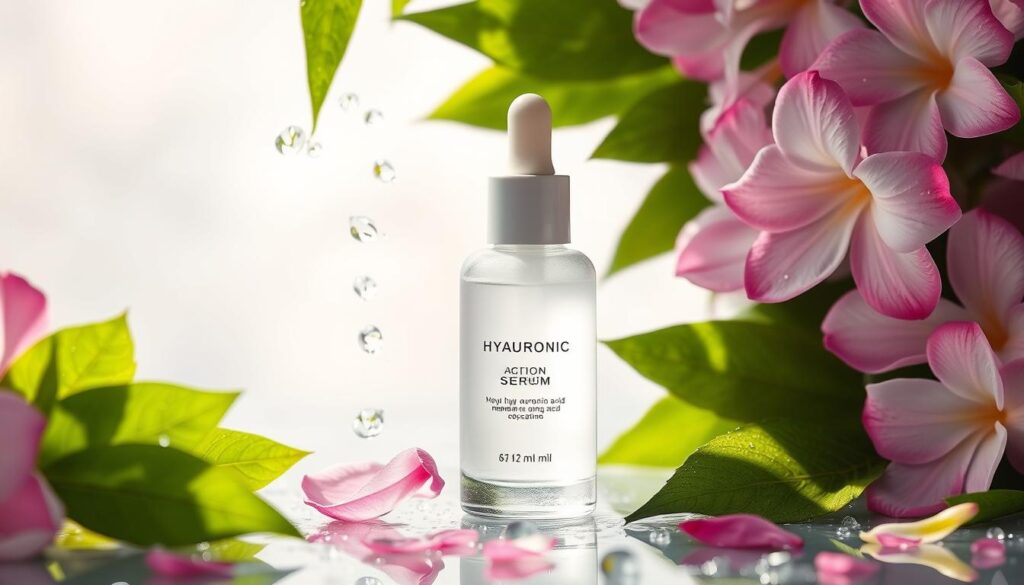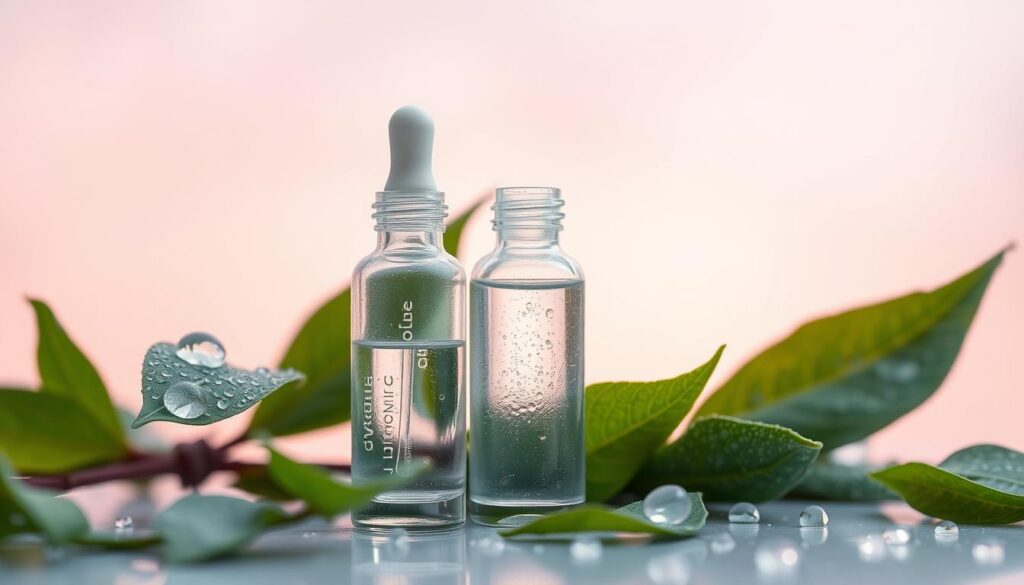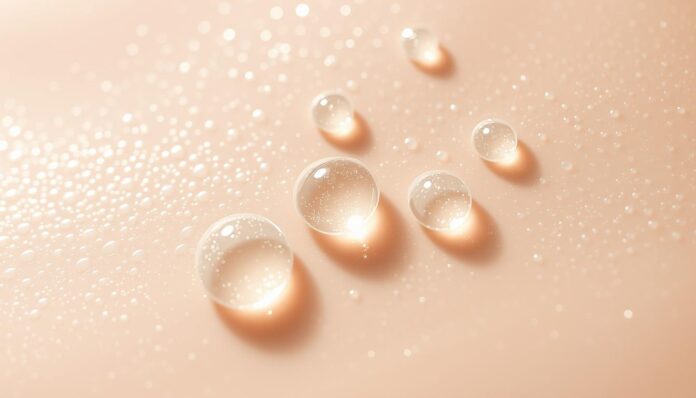Hyaluronic Acid is known as the ultimate moisturizer. It can attract and retain water incredibly well. This makes it a standout in skincare.
It works like a sponge, keeping your skin moist, full, and young-looking. Its anti-aging effects are impressive, vital for a good beauty routine. Hyaluronic Acid helps keep your skin supple and is found in many beauty products. It’s essential for everyday use.
Key Takeaways
- Hyaluronic Acid is a potent moisturizer that hydrates the skin.
- This ingredient is essential for effective skincare routines.
- It plays a significant role in anti-aging by reducing fine lines.
- Using Hyaluronic Acid leads to enhanced skin elasticity.
- Understanding its properties is key to achieving lasting hydration.
- It is suitable for all skin types, offering versatile benefits.
Understanding Hyaluronic Acid
Hyaluronic Acid is a well-known natural ingredient important for keeping the skin moist. It’s found all over the human body, especially in the skin, connective tissues, and cartilage. It works by holding onto water, which helps keep the skin plump and elastic.
What Is Hyaluronic Acid?
This compound can absorb up to 1,000 times its weight in water, which makes it excellent for moisturizing the skin. It ensures the skin stays soft and young-looking. Because it’s natural, Hyaluronic Acid works well with the body, improving skin health and its look.
The Science Behind Its Moisturizing Properties
Hyaluronic Acid can hold a lot of water because of its unique structure. This is key for keeping the skin’s protective barrier strong. This barrier defends against harmful elements while keeping the skin hydrated. Skincare products with Hyaluronic Acid boost moisture, offering quick and lasting results. It’s a favorite ingredient in many products for its ability to give the skin a glowing, full look.
The Benefits of Using Hyaluronic Acid for Your Skin
Hyaluronic acid is great for all skin types. It deeply hydrates, making skin supple and radiant. Its formula is light and not greasy. So, everyone can enjoy its benefits.
Deep Hydration for All Skin Types
Hyaluronic acid provides deep hydration, which is key for healthy skin. It goes into the skin, keeps moisture in, and stops dryness. This is especially good for sensitive skin, making it look balanced and refreshed. Skin texture gets better with regular use.
Enhancing Skin Elasticity and Firmness
Adding hyaluronic acid to your skincare improves elasticity and firmness. Over time, your skin looks plumper and shows fewer signs of aging. It helps cells repair and renew, leading to smoother, younger skin.
| Benefits | Impact on Skin |
|---|---|
| Deep Hydration | Supple and radiant complexion |
| Moisture Retention | Prevents dryness and revitalizes skin |
| Improved Elasticity | Increased firmness and smoothness |
| Youthful Appearance | Reduces signs of aging, such as fine lines |
Hyaluronic Acid as an Anti-Aging Agent
Hyaluronic Acid is a key player in fighting aging skin. It holds moisture well, making fine lines and wrinkles less visible. It smooths the skin and fills it with needed moisture.
How It Reduces the Appearance of Wrinkles
It fills in wrinkles, making the skin look younger. Hyaluronic Acid pulls moisture to dry skin, softening age signs. It helps keep the skin hydrated, so fine lines look smoother.
Revitalizing Dull Skin for a Youthful Glow
Hyaluronic Acid also perks up tired, dull skin. It boosts moisture for a healthier, brighter face. With regular use, it improves skin and brings out a youthful radiance. Adding it to your skincare routine can make aging skin look lively and fresh.

Incorporating Hyaluronic Acid into Your Skincare Routine
Adding Hyaluronic Acid to your skincare helps keep your skin well-hydrated and healthy. It’s important to select the right products to get all its benefits. Look for serums, moisturizers, and masks with Hyaluronic Acid high up on the ingredient list. This makes sure your skin stays hydrated in the best way.
Choosing the Right Products
When picking products with Hyaluronic Acid, the concentration and the way it’s made matter. Serums offer a strong dose of hydration. Moisturizers with things like glycerin or ceramides lock in moisture well. Sheet masks are great for quick hydration. Choose according to your skin type, be it oily, dry, or combination.
Application Tips for Maximum Benefits
For the best effect, apply Hyaluronic Acid on damp skin. This trick seals in moisture better. Layering is important for deeper hydration. Start with a Hyaluronic Acid serum, then use your regular moisturizer.
Using this ingredient morning and night improves results. Mixing it with Vitamin C or retinoids makes your skincare more powerful. This way, you create a routine that’s just right for your skin.
Natural Sources of Hyaluronic Acid
Add natural sources of hyaluronic acid to your diet to enhance skin health. Foods rich in hyaluronic acid can improve your skin’s hydration and elasticity. They help your body make more of it. It’s good to know about these foods, plus supplements and skin products.
Food Sources for Skin Nourishment
Eating the right foods keeps your skin looking good by maintaining hyaluronic acid. Here are some foods to include in your meals:
- Bone broth: Rich in collagen and amino acids that support skin health.
- Soy products: Foods like tofu and edamame help boost hyaluronic acid production.
- Leafy greens: Spinach and kale are full of antioxidants that can improve overall skin hydration.
Include foods high in antioxidants and healthy fats, like avocados and nuts. They make your skin smooth and soft.
The Role of Supplements and Topical Solutions
Supplements are a helpful way to get more hyaluronic acid. You can find them as tablets or powders. Skin creams and serums put hyaluronic acid right where you need it.
The Safety and Efficacy of Hyaluronic Acid
Understanding Hyaluronic Acid’s safety is crucial for skincare or cosmetic uses. It’s usually safe, with both topical and injectable types causing few problems. Still, some might see mild irritation or allergies. A patch test is smart for those with sensitive skin, ensuring comfort before full use.
Possible Side Effects and Precautions
Hyaluronic acid is known for keeping skin moist. But there can be side effects. People often report:
- Redness and swelling at the injection site
- Itching or rash
- Bruising after cosmetic treatments
For safety, always see a pro for injectable hyaluronic acid cosmetics. They make treatments safer and work better by customizing the approach.
Hyaluronic Acid in Dermal Fillers
Hyaluronic Acid is key in dermal fillers. These cosmetics use it to bring back skin volume and moisture, showing effects right away. There are many types, each serving different beauty goals.
Knowing about the various hyaluronic acid fillers helps in making wise choices for your beauty needs. Getting to know these options means heading into cosmetics with more certainty.

Hyaluronic Acid for Joint Health
Hyaluronic Acid is not just for skin hydration. It also plays a big part in keeping your joints healthy. This substance is key for our overall wellness.
Benefits Beyond the Skin
Hyaluronic Acid boosts many aspects of health. One major benefit is joint lubrication, which is crucial for bone movements. This lubrication helps to lessen friction and eases discomfort during activities.
People with joint pain or stiffness find this substance very helpful.
How It Supports Healthy Joints
For healthy joints, Hyaluronic Acid is vital. It keeps the cartilage moist, providing cushioning for our joints. Good levels mean better flexibility and mobility, important for staying active.
Taking Hyaluronic Acid through food or supplements boosts joint health significantly.
Common Misconceptions About Hyaluronic Acid
Hyaluronic Acid is big in skincare, but many get its perks wrong. Some think only older skin needs it. The real hyaluronic acid facts clear up this mistake. It’s good for keeping skin moist, no matter your age or skin type.
Debunking Myths Surrounding This Powerful Ingredient
A common myth is that Hyaluronic Acid can over-hydrate, causing skin problems. But it’s really key for moisture balance. It holds water well, enhancing skin health. It does so without overburdening the skin’s defenses. This keeps hydration just right, avoiding any water logging.
Understanding Its Role in Hydration
How Hyaluronic Acid aids skin moisturizing often puzzles folks. Its unique ability to keep moisture is a big win for skin care. It stops skin from drying out. Learning about the hydration role of Hyaluronic Acid helps in using it right day by day.
| Misconception | Reality |
|---|---|
| Only beneficial for aging skin | Helps hydrate and improve skin for all ages |
| Overly hydrates the skin | Balances moisture without causing overload |
| Not effective for dry skin | Significantly enhances hydration and prevents dryness |
Conclusion
Hyaluronic Acid is a key ingredient in skincare that you shouldn’t miss. It deeply hydrates, improves skin elasticity, and fights aging. This makes it perfect for anyone wanting to keep their skin looking young and vibrant. Using Hyaluronic Acid can make your skin healthier and more alive.
Adding Hyaluronic Acid to your daily routine can do wonders. You can find it in serums, creams, or even in some foods. It’s not just good for your skin but for your overall health too. As its popularity grows, it’s clear that it’s a top pick for skin care.
But Hyaluronic Acid is more than just about looking good. It’s about feeling good in your skin, at any age. Making it a part of your skincare means caring for both your beauty and well-being. It’s a step towards celebrating your skin through every stage of life.
